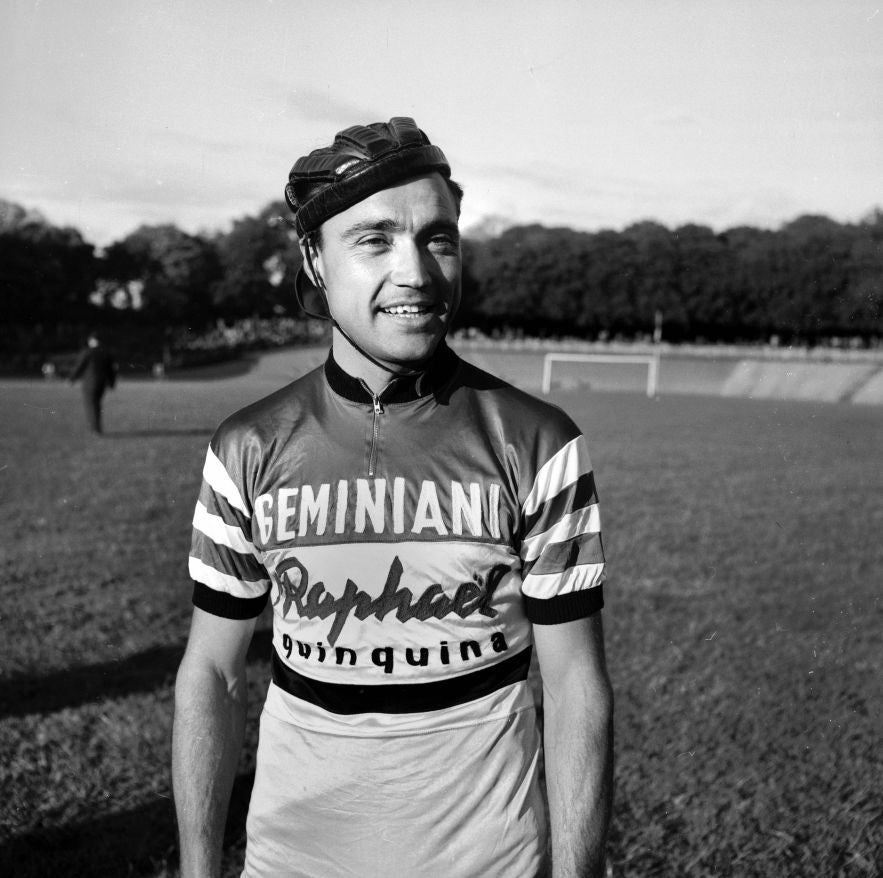Miguel Poblet: Spanish cycling legend known for his ferocious sprint finishes
As a child, Poblet's father made him ride up an agonisingly steep 300m slope every day

The first time I met Miguel Poblet, Catalonia's greatest ever cyclist with more than 180 professional victories to his name, he was standing ignored and alone on a train platform in an anonymous Barcelona suburb – and in some ways, both for its sense of solitude and an imminent departure, by chance the image could not have been more appropriate.
From a cycling point of view, Poblet was unlucky to be born in a country which vastly over-rated, then as now, Grand Tour overall classifications, and Poblet's huge achievements in one-day Classics and bunch sprints in the 1950s and 60s were (and are) rarely given much credit in Spain. As he said last year, perhaps a shade bitterly, "I can walk through the streets of my town without anybody knowing who I am."
If he wanted to make a living from his sport, Poblet had to emigrate, first to France in 1954, where he crossed paths with a very young Jacques Anquetil, five times a Tour winner, in the La Perle squad. But his true spiritual home was in Italy with the yellow-clad Ignis squad; there he was idolised and given exotic nicknames like "the Yellow Arrow", "Sancho Panza", or simply "Mig" – a reference to the Russian fighter planes and Poblet's supersonically fast sprint finishes.
Poblet only returned to Catalonia when he retired in 1963, starting a business in his Barcelona home in the working class suburb of Montcada, selling fridges – which, he told me, was far more profitable than bike racing.
Poblet was not just an anomaly because there was no heritage of Spanish Classics riders preceding him – and indeed none after him until triple World Champion Óscar Freire in the late 1990s. His father, Enric, who owned a bike shop, was determined that Poblet junior would be the best climber in the world, despite his son's short, stocky physique having "sprinter" written all over it – and as a child, Miguel was made to ride up an agonisingly steep 300m slope in Moncada every day.
Perhaps as a result, Poblet developed a rich vein of climbing talent, and – after falsifying his date of birth on his licence so he could start racing at 16 – Poblet's earliest big victories were a hat-trick of wins in Spain's National Mountain Championships. His extreme youth, taking 10 wins in his first year ahead of grizzled pros 10 or 15 years his senior, earned him his first nickname, too: "the Moncada baby".
Poblet's Tour debut in 1955 could not have been more memorable, with victories on the first and last stages, riding first over the Tourmalet, the toughest Pyrenean climb, in a break with Tour greats Charly Gaul, Louison Bobet and Jesús Loroño – and to cap it all, taking Spain's first ever lead in cycling's blue riband event. In 1955, he also claimed victories in the Giro and Vuelta, the first rider to win stages in all three major races in a single year. Only two other riders, Piero Baffi and Alessandro Petacchi, have since managed the same feat.
All of his Grand Tour victories were with the Spanish national squad. However, Poblet's real run of success came with an Italian team sponsored by the domestic appliances company Ignis, which he joined in 1957. Sixth overall in the Giro three times, Poblet also racked up the bulk of his 20 stage wins in Italy's number one race with Ignis. But it was what would have been the 21st – when, lying second overall, he came within three kilometres of winning the key Giro stage in the Dolomites in 1958, only to puncture – for which he is most famous. The spectacular photo of Poblet, wheel aloft and enraged as his team car failed to reach him with a spare, has become a legend in its own right.
He also took his home race, the Volta a Catalunya, twice; the Milan-San Remo also twice – once helped by Britain's own cycling pioneer Brian Robinson in the sprint; and came within a whisker of winning Paris-Roubaix in 1958.
He had prepared for riding over the race's pavés – the giant paving stones of northern France's back roads – by hammering over poorly cobbled streets in Barcelona. However, in a 23-man sprint he was pipped to the line in Roubaix velodrome, after eight hours of racing, by León Vandaele. No Spaniard has ever come so close to winning cycling's most infamous Classic since: as Poblet would like to say, "I lost it by 15 centimetres."
After retiring, Poblet drove a lorry home from Spain to Italy with Ignis fridges and washing machines piled high in the back, and sales went so well he opted to set up a business. But Spain would have to wait for nearly 40 years before it produced another great Classics specialist: triple World Champion Oscar Freire, for whom Poblet acted as an unpaid advisor, calling him up and telling him the best techniques for how to win one-day races.
The two were so similar as racers, Freire even partly inherited yet another of Poblet's nickname: "the Magical Cat". Like Poblet, Freire was dubbed "The Cat" for an uncanny feline knack of waiting unnoticed and inert in the pack until the last possible moment of a sprint, when a metaphorical paw would lash out and pin down a win: in Poblet's case, a mere 186 times in his career.
Miguel Poblet, cyclist: born Montcada, Spain 18 March 1926; died Barcelona 6 April 2013.
Join our commenting forum
Join thought-provoking conversations, follow other Independent readers and see their replies
Comments
Bookmark popover
Removed from bookmarks